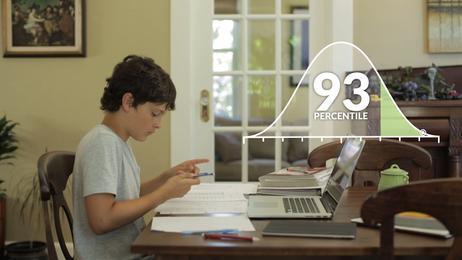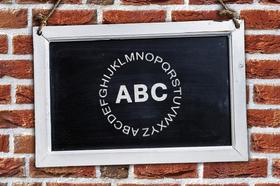A Parent’s Guide to Private School Entrance Exams
There are many reasons why a private, independent, or boarding school could be an excellent option for your child.
- Private schools typically offer thrilling academic challenges, extensive STEM or arts programs, or other remarkable resources.
- Their student-teacher ratios are low.
- Their faculty usually have advanced academic degrees and strong professional reputations.

About 10 percent of students attend private schools nationwide.
- Private school admissions tend to be selective and in many cases competitive.
- To help distinguish applicants who meet admission standards, private schools use standardized testing.
- The Independent School Entrance Exam (ISEE) and Secondary School Admissions Exam (SSAT) are the most commonly used admissions tests for private, independent, and boarding schools.
- The High School Placement Test (HSPT) is often used by Catholic schools for entrance into grade 9.
The ISEE and SSAT are long multiple-choice tests lasting 2-3 hours and potentially covering above-grade-level content.
- For the 4th grader applying to a private middle school, this might be the first time they have undergone two hours of solid testing with only one or two short breaks.
- The best starting point is always to have your student take a full-length diagnostic test.
- It’s important to know where your child is starting from so that you can help them get to where they need to be.
This video offers an overview of the ISEE private school standardized admissions test.
ISEE & SSAT: Similarities and Differences
Which test does the school you are looking at require?
- Look at your target schools' websites.
- Call or email the admissions offices to determine which test(s) these schools accept.
- If the school accepts results from either exam, understanding the differences between the two will help you select the test most appropriate for your child.
- The ISEE and SSAT tests have similar subject matter.
- They both have a verbal section, a reading section, two math sections, and a writing sample.
The following are a few ways in which the two tests differ:
Subject Emphasis
Both the SSAT and ISEE have four multiple-choice sections: 2 math, one verbal, and one reading.
- Score presentation differs between the two tests, however.
- The ISEE provides 4 section scores, 1 for each of the sections.
- The SSAT combines the two math scores into 1.
- Is math a strong suit for your child or a weak point?
- If it’s a strength, the ISEE may help to emphasize that.
- If it’s a weakness, the SSAT might be a good choice.
Scoring
The SSAT (for Middle and Upper Levels) has a ¼ point wrong-answer penalty; however, the ISEE does not.
- Is your child a confident test-taker?
- If they are prone to test anxiety, the ISEE may be a less stressful test.
Writing
Both the SSAT and the ISEE have an unscored writing sample.
- The ISEE offers a single, expository writing prompt.
- The SSAT offers Middle-Level students the choice between two creative writing prompts.
- Upper-level students have the choice between a creative writing prompt and an expository prompt.
- Does your student have a creative streak? The SSAT might help them shine.
Verbal Skills
The SSAT features analogies in the Verbal Section, while the ISEE has sentence completions.
- Analogies may require more reasoning than sentence completions of the ISEE.
- Which of these better matches your child’s skill set?
- To determine which test will best highlight your child’s strengths, have your child take a practice test of each.
- Get started with practice tests for the ISEE or SSAT now.
You can also check out this blog post for more detailed information on the differences between the two tests.
This video offers an overview of the SSAT private school standardized admissions exam.
The Importance of the ISEE and SSAT: Results Matter
Private and independent school admission officers often explain that they take a holistic approach to assessing how well a prospective student might fit into their school.
- Fit encompasses academics, character, extracurricular activities, post-graduation plans, and more.
- While the ISEE or SSAT is only one aspect of the application, admissions teams will evaluate each student’s test scores in the context of many other applicants.
- It is important that scores are high enough that they are consistent with the rest of the application and reflect the true capacity of the student.
Test-Taking is a Skill That Can Be Taught
Like any performance-based activity, test-taking is a skill that can be learned.
- These exams are challenging and intentionally expose test-takers to material and question types not covered in a standard curriculum.
- Research indicates that test-taking behavior is important beyond content knowledge for optimum test performance.
- Exposure and consistent practice have proven to be the most efficient method to tame both tough questions and test-related stress.
Understanding Strengths and Weaknesses
The most expedient way to determine how much prior study will be required is to take a full-length practice test as early as possible.
- This serves as a diagnostic.
- It indicates how the student would score if taking the test today.
- Itprovides a practice roadmap, pinpointing strengths and weaknesses.
Choosing a practice test company
- Does the company specialize in ISEE and SSAT test prep?
- How long has the company been in business, and how many students have utilized the platform?
- How frequently is the content updated?
- Do the practice tests match existing exams?
- Are the questions and solutions provided accurate to the test?
- Are there additional services, such as video courses or tutoring, available?
- Is this a platform used internally by private and independent schools to teach test prep?
The Test Practice Book
- How current is the book?
- What are the credentials of the author?
- Can you purchase updated printed materials or add-on question banks?
- Does it contain multiple full-length exams or just sample questions?
- How many verified reviews of the book are there?
Ultimately, the most important factor of all is preparation.
- Invest the time to expose your student to what lies ahead.
- Parents can make this path smoother for their children by finding resources to help them prepare.
Conclusion
Private school entrance exams are a crucial component of the admissions process, offering schools valuable insights into a student's academic potential. By understanding the differences between tests like the ISEE and SSAT and tailoring preparation to your child's strengths, you can help them approach these exams with confidence. Remember, preparation is key—investing time in practice tests and targeted study will ensure your child is ready to showcase their abilities and succeed in gaining admission to their dream school.
Questions? Contact us on Facebook, Instagram, and YouTube. @privateschoolreview
#PrivateSchoolAdmissions #ISEE #SSAT #HSPT #TestPrep #EducationGuide #ParentTips #AcademicSuccess #PrivateSchools
Test Innovators, Inc. offers an advanced online test prep solution that leverages aspects of machine learning, AI, and big data to improve test scores and help students gain acceptance into schools with selective admissions processes. Test Innovators' proprietary practice tests accurately reflect the official tests; practice exercises, scoring results, and related information are used to help students understand the gap between their existing scores and what they need to be accepted at their school of choice.











